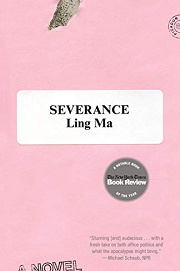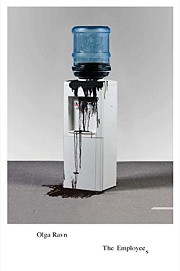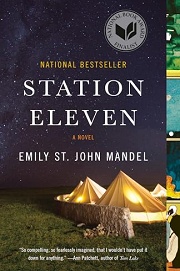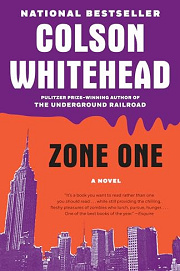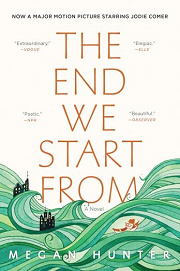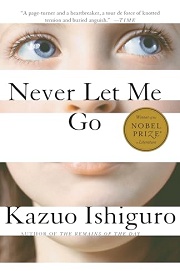Share your thoughts in a quick Shelf Talk!
Severance by Ling Ma
In a world slowed by a mysterious pandemic, a millennial office worker drifts through routines as civilization quietly unravels. Darkly funny and eerily prescient, Severance captures the rhythms of work, memory, and migration in a story you’ll keep thinking about long after.
Have you read this book? Share what you liked (or didn’t), and we’ll use your answers to recommend your next favorite read!
Love Severance but not sure what to read next?
These picks are popular with readers who enjoyed this book. Complete a quick Shelf Talk to get recommendations made just for you! Warning: possible spoilers for Severance below.
In Severance, did you enjoy ...
... deadpan, anti-capitalist workplace satire and characters trapped in mindless routines?
The Employees by Olga Ravn
If you loved how Candace keeps clocking in at Spectra to shepherd a luxury Bible even as Shen Fever unspools the world—and how the fevered repeat their tasks to the point of oblivion—then you’ll relish the bleakly funny HR memos and performance reviews in The Employees. Told through crew statements on a spaceship, it skewers productivity-speak and corporate dehumanization as workers fixate on inexplicable “objects.” The same absurd, ritualized labor that haunts Candace’s blogged strolls through empty Manhattan becomes cosmic and eerily moving here.
... the back-and-forth structure braiding pre-collapse life with the aftermath?
Station Eleven by Emily St. John Mandel
You enjoyed how Severance toggles between Candace’s New York office days (NY Ghost shoots, Spectra deadlines) and her later trek under Bob’s watch—letting each timeline refract the other. Station Eleven does the same elegant shuffle: it interleaves the night a famous actor dies with a traveling troupe’s post-pandemic circuit years later, revealing how art, memory, and small choices echo across the divide. That temporal weaving builds the same accumulating poignancy you felt watching Candace’s past and present collide.
... a plague-ravaged world where survival groups drift under dubious leaders and routines become their own trap?
Zone One by Colson Whitehead
If the uneasy caravan in Severance—Bob’s rules, supply runs, and the hypnotic pull of rote tasks (like the fevered folding and setting tables)—hooked you, Zone One delivers a similarly sardonic afterlife. Mark Spitz “cleans” lower Manhattan of stragglers while clinging to rituals that barely hold meaning. It’s mordant, funny, and haunted by office-life echoes, much like Candace’s insistence on working through the end as if a status meeting might fix it.
... an intimate, interior portrait of a pregnant survivor negotiating memory, identity, and obligation?
The End We Start From by Megan Hunter
Candace’s pregnancy and solitary reflections—balancing practical survival with a fierce need to preserve self, routine, and the baby’s future—give Severance its quiet ache. The End We Start From narrows to a new mother navigating a flooded Britain, rendered in spare, luminous fragments. Like Candace’s inward gaze and careful cataloging (those stark NY Ghost images), this voicey novella dwells in the mind as much as the ruined world, making every choice feel intimate and immense.
... quiet, low-tech dystopia that foregrounds human relationships over worldbuilding?
Never Let Me Go by Kazuo Ishiguro
If the soft-focus speculative frame of Severance drew you in—Shen Fever as a chilling backdrop while the real story is Candace’s work, love with Jonathan, and the uneasy commune under Bob—then Never Let Me Go will resonate. Ishiguro reveals his dystopia obliquely, letting friendships and memory carry the weight. As with Candace’s understated narration, the horror accumulates through routine and reminiscence rather than tech or lore, landing with a devastating, human clarity.
Unlock your personalized book recommendations! Just take a quick Shelf Talk for Severance by Ling Ma. It’s only a few questions and takes less than a minute.
